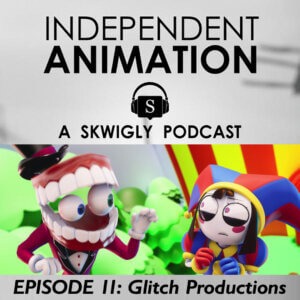Independent Animation #11 – Glitch Productions
 In the eleventh episode of Independent Animation, our companion podcast series to the Skwigly tie-in book Independent Animation: Developing, Producing and Distributing Your Animated Films (Taylor & Francis/CRC Press), Skwigly contributor Mel Cionco speaks with Jasmine Yang, General Manager and Development Producer at Glitch Productions.
In the eleventh episode of Independent Animation, our companion podcast series to the Skwigly tie-in book Independent Animation: Developing, Producing and Distributing Your Animated Films (Taylor & Francis/CRC Press), Skwigly contributor Mel Cionco speaks with Jasmine Yang, General Manager and Development Producer at Glitch Productions.
One of Australia’s largest web animation studios, Glitch Productions grew from YouTube personalities Kevin and Luke Lerdwichagul’s enthusiasm for creating comedic online content that would amass them a sizeable following.
After shifting their attentions toward independent animation, as Glitch Productions they would go on to produce several fully-realised animated series outside of the established norms of the traditional studio system, including SMG4, Sunset Paradise, Meta Runner and Murder Drones.
The studio’s recently-released CG pilot, The Amazing Digital Circus created by indie artist and musician Gooseworx, has proved their most well-received endeavour to date, amassing a staggering 180 million+ views at the time of this podcast’s release, two months after it premiered. Described as ‘a psychological dark comedy about cute cartoon characters who hate their lives and want to leave’, the pilot has already built up an enormous and devoted fanbase and the studio have hopes for a full, eight-episode season to follow.
Accompanying the podcast interview with Jasmine Yang, Mel was also able to interview The Amazing Digital Circus creator Gooseworx via email:
It really is a totally different beast from doing everything by yourself. From the outside, it seems like it’d be easier, but managing a bunch of people, and being able to articulate nuances of what you want is a whole different skillset I wasn’t really prepared for. It took me a while to adjust. Not to mention when you’re doing something completely by yourself, you can get away with being really sloppy in certain aspects, or change things on a whim. In a production pipeline, you really have to know what you want, which was frightening for me, a person who never knows what they want.
If you’re starting out, there’s part of me that’s like “follow your dreams” but there’s also part of me that’s like “This is going to be an unbelievable amount of work, and you’re probably not going to see success for a long while.” I think it really is just finding a balance between aspiration and expectation. I got unbelievably lucky, but I have friends who are a million times more talented than me who can barely afford to finish their projects while also being able to afford food. My good friend Zeurel is a trooper in that regard. Be persistent, but also know how to adapt.
This is gonna sound weird, but there really weren’t a lot of limitations, at least not from a technical standpoint. Every one of my weird ideas that they were iffy about in terms of “are we actually gonna be able to pull this visual off?” ended up making it into the final product with the help of the incredibly talented team we have. The biggest limitation for me is time. I have a bad habit of making scripts really long, or pacing things out to be way over our limitations. There’s a lot of pre-production time dedicated to keeping me in check and not letting these things get overly bloated with goose slop.
Everything that was good ended up sticking. Mostly everything that gets cut ends up being jokes that don’t really work, or scenes that could be reworked in a way to where they’re more concise, as well as more entertaining.
Presented by Ben Mitchell and Mel Cionco
Produced by Ben Mitchell
Interview conducted by Mel Cionco
Music by Ben Mitchell

